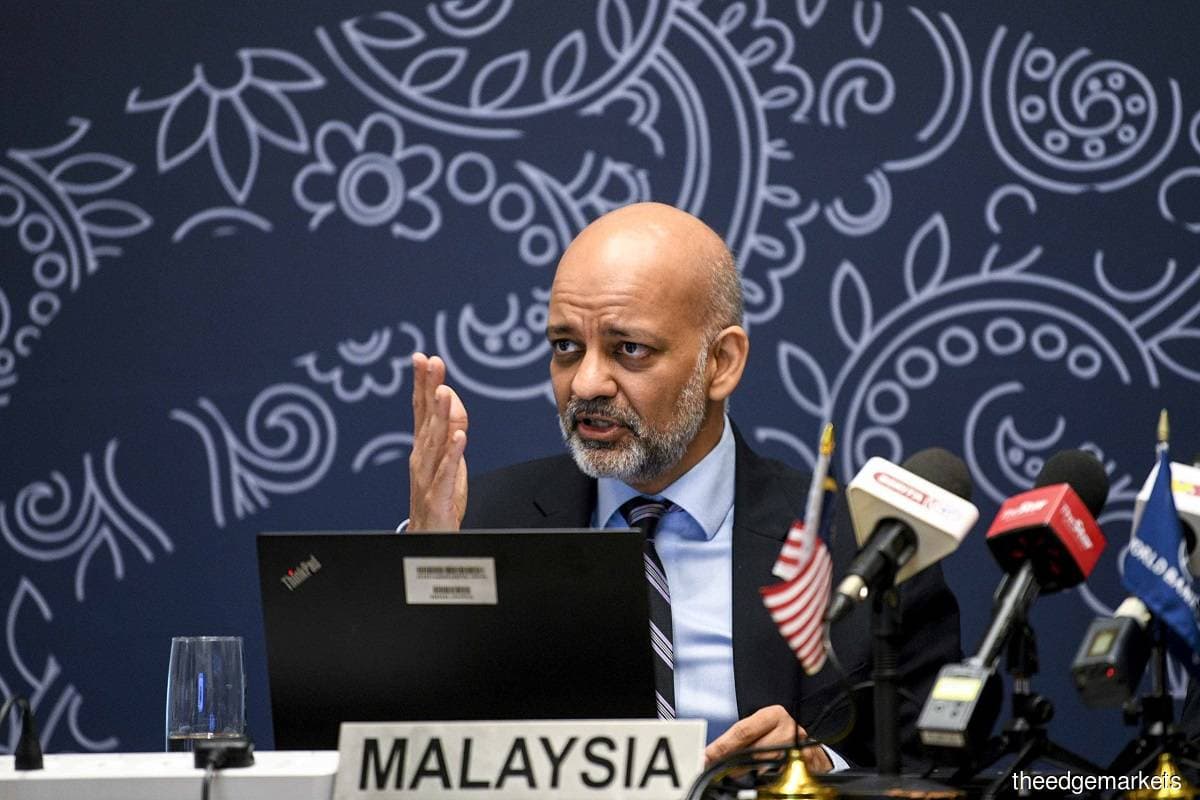
KUALA LUMPUR (Feb 3): The World Bank Group recommends that the new government mobilises strategies for targeted subsidies in the revised Budget 2023, as a big bulk of the federal government’s cash is spent on trotting out subsidies.
Fuel subsidy allocation, in particular, is still high and needs to be addressed for long-term fiscal sustainability, said World Bank’s lead economist for macroeconomics, trade and investment Dr Apurva Sanghi.
“The biggest expenditure saving for the government would come from subsidy rationalisation; 2.3% of GDP (gross domestic product) is spent on just fuel subsidy, which is way more than 1.9% of GDP spent on the Ministry of Health's budget.
“Putting in plans to phase out blanket, broad-based subsidies and moving towards a more targeted subsidy framework that would benefit lower income households is relevant and timely,” he said at a media briefing on World Bank’s Malaysia Economic Monitor February 2023 themed ‘Expanding Malaysia’s Digital Frontier’ on Friday (Feb 3).
The success of targeted subsidy implementation lies in the logistical infrastructure to identify the deserving group and the extent of the new government’s political willingness, he said.
“[A] practical challenge, if the government wants to remove subsidies, is it may not have the logistical infrastructure to identify people to whom targeted subsidies should go to. The framework is still very fragmented. But in any case, the government can use the Bantuan Keluarga Malaysia (BKM) platform to reach out to the subsidy deserving group,” he said.
However, there must be political willingness to implement targeted subsidies for the government to fully commit to such an intervention.
“Who benefits from the current subsidies? It is the top- and middle-income earners. If you remove subsidies, the top may not care, but the middle class would complain. There are also electoral issues because in many countries the middle class is a sizeable voting class. So, this is the political economy part of the subsidy that the government finds hard to overcome,” he said.
He added that blanket subsidies are regressive in nature, with the benefits enjoyed disproportionately by higher-income households.
Government estimates suggest that the richest 20% of households in Malaysia received about 53% of the fuel subsidy.
Subsidy is not a reward for paying tax
Government subsidies, which are largely funded by tax revenues, are essentially meant to help only the low-income group bracket.
World Bank's senior economist for macroeconomics, trade and investment Shakira Teh Sharifuddin said the narrative around the understanding of subsidies has to be tweaked to drive the changes.
“We should understand the concept of subsidy. It is supposed to be an assistance for a specific group of people who need it most. It is not meant to be an incentive, and certainly not meant to be a reward for paying tax,” said Shakira.
“I think that is the concept that needs to be communicated effectively, and transparently. I think that should be the first step in subsidy reforms and moving towards targeted subsidy efforts,” she added.
Apurva said targeting select groups for subsidies will raise errors due to imperfect measurement and information, particularly errors of exclusion where a genuinely deserving group is excluded from the subsidy programme while the error of inclusion includes non-eligible people in the subsidy programme.
“Of course, there are areas you can tweak, such as errors of inclusion and exclusion. No targeted mechanism is perfect. But I would argue that it is okay to have some errors of inclusion which should not come at the cost of exclusion. In some ways, countries like Indonesia, which has a good track record of subsidy removal, did that,” said Apurva.
Subsidy removal spikes inflation?
The shift towards a targeted framework should also be gradual, as a sudden and abrupt complete removal could lead to a sharp increase in inflation.
For example, a rise in fuel price increases prices in the transport sector (among others), which in turn raises prices for all other sectors including the fuel sector, said Apurva.
“Yes, it is inflationary. The answer is to do it gradually and to put in mechanisms that will help those who are most affected due to its inflationary impact. Use the window of opportunity we have right now of falling commodity prices and falling inflation to think about putting this in place,” he added.
The World Bank report noted that completely removing fuel subsidies is likely to cause a 9% increase in consumer prices, whereas the effect on producer prices and the GDP deflator is likely to be relatively lower, with producer prices at 8.2% and the GDP deflator at 6.78%.
In short, the price impact of the subsidy removal is not uniform across sectors.
Sectors with a higher share of fuel input, such as chemical and transport, are expected to experience a large price increase — upwards of 20% — following the removal of fuel subsidies.
On the other hand, service sectors such as telecommunications and insurance, which rely less on fuel as input, are likely to be only marginally affected.

